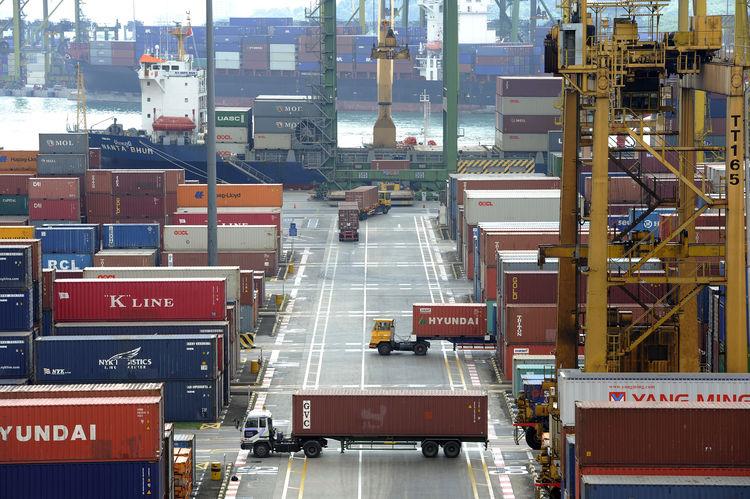- Agric Leads Non-oil Export Proceeds with N105.06bn in First Quarter
Efforts by the federal government to diversify the economy and generate foreign exchange from other sources might have started yielding the needed results as the trade statistics report by the National Bureau of Statistics (NBS), revealed that the exportation of agricultural goods grew by 82 per cent in the first quarter of 2017.
The sectoral breakdown showed that proceeds from agricultural products stood at $340 million (N105.06 billion) in the first quarter of 2017, representing 39.5 per cent of total non-oil export proceeds. Food products, manufactured products and industrial goods counted for 10.8 per cent, 16.9 per cent and 10.9 per cent respectively.
However, the latest quarterly Economic Report from the Central Bank of Nigeria (CBN) puts non-oil exports provisionally at $87 million (N26.88) in Q1 2017, indicating a substantial rise of 86 per cent Quarter-on-Quarter ( q/q). However, they declined by 15 per cent Year-on-Year (y/y).
Analysts believe the q/q surge was attributed to a significant increase in receipts from food and agricultural products.
They however warned that the federal government should urgently address increasing drive by farmers to export their produce, a situation, they stressed will fuel the rise in food inflation.
According to analysts at FBN Quest, “We note that food inflation has risen steadily over the past few months (January – March 2017 inclusive). One likely reason, although anecdotal at this stage, is the increasing preference of farmers to export their produce as opposed to supplying domestically. In our view, this preference can be linked to the fact that the currency has depreciated by 56 per cent from N196/US$ on the interbank market over the period in question (i.e. Q1 2017 vs Q1 2016).”
They added: “The Federal Government of Nigeria (FGN) has announced its intention to boost export activities through payment of the export expansion grant (EEG). The EEG was suspended in 2014. However, N20bn was set aside for its revival in this year’s budget.
“The Manufacturers Association of Nigeria (MAN), following discussions with the authorities, thinks that the new grant may have lower rates than previously, be robustly designed to prevent abuse by applicants and reward exporters for value addition.”
The Minister of Agriculture, Audu Ogbe recently formally flagged off the export of yam with 72 tons of the produce exported to Europe.
Speaking during the flag off of the project at the Lilypond Container Terminal, Ijora, Lagos, Ogbe said he considers the event another giant leap in the country’s quest to grow the agricultural sector towards the diversification of the nation’s revenue base and conservation of foreign exchange by limiting citizen’s appetite for imported food.
“The 72 tonnes is going out in three containers but this is just the beginning; more will follow. There is demand in China, everywhere where Nigerians are and until we stabilise the economy through serious work like this, there will never be peace and stability,” he said.
While emphasising the need for farmers to ensure quality control, Ogbe appealed to exporters to ensure that their produce meet global standard as Nigeria can no longer afford the embarrassment of product rejection.
He said there is high demand for Nigerian yam once international standards are met; adding the federal government was working at taking yam production, processing and marketing in Nigeria to the level of that obtains in Ghana.
According to him, Ghana yam export trade employs over one million people with the country currently accounting for 94 percent of the total yam export in West Africa and covering markets in Canada, UK and Europe.
The minister also assured that the yam export drive would not lead to the product’s scarcity at home.
“I am aware that since we made the announcement that we are going to export yams, Nigerians have begun to express anxiety. I have seen people say we are hungry and you are exporting our yam. Quite frankly, I appreciate the point they are making but the truth is that the yams we export will in no way diminish the quantity at home. Most of the yams we produce rot away.
“New yam will be here in two weeks, the old stock is still there and people in the markets are getting worried but the new yam will come and nobody will touch the old one. We actually overproduce food here,” he said.

 Naira4 weeks ago
Naira4 weeks ago


 Naira4 weeks ago
Naira4 weeks ago




 Naira4 weeks ago
Naira4 weeks ago




 Naira3 weeks ago
Naira3 weeks ago
 Commodities4 weeks ago
Commodities4 weeks ago


 News4 weeks ago
News4 weeks ago
 Travel4 weeks ago
Travel4 weeks ago




 Naira3 weeks ago
Naira3 weeks ago






















